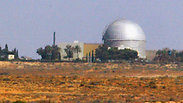
Israel's nuclear reactor at Dimona
Photo: Getty
VIENNA - The United States and three European allies want a global body controlling nuclear exports to consider whether to establish closer ties with non-members including Israel, despite its assumed atomic arsenal, a confidential document shows.
The issue is sensitive as Israel is outside a 1970 international pact designed to prevent the spread of nuclear weapons and the Jewish state is widely believed to be the only country with such arms in the volatile Middle East.
Arab states and Iran often criticize Israel for not signing up to the nuclear Non-Proliferation Treaty. Israel and Washington say it is Iran, which is in the 189-nation NPT, that poses the region's most urgent proliferation threat, although Tehran says its program is for peaceful uses only.
Related stories:
- Yuval Eylon / Disarm Israel of nuclear weapons
- UN nuclear assembly rejects Arab push on Israel
Dayan to Golda: We should prepare nuclear option
With the spread of nuclear technology, and the fears of it falling into the hands of militants or states the West fears could illicitly work on a weapons program, trade transparency and cooperation are seen as becoming more important.
In view of this, the United States, Britain and the Czech Republic sponsored a Dutch paper submitted ahead of a meeting last week of the Nuclear Suppliers Group (NSG), set up in 1975 to ensure that civilian nuclear exports are not diverted for military purposes. All members have signed the NPT.
"With technology progressing at an ever increasing rate, globalised supply chains, and more and more countries developing nuclear and dual use capabilities, the possibility of trade in nuclear related goods between governments not participating in the NSG is becoming more and more likely," the paper said.
"In order to stay ahead of the curve, the NSG's goals - to control the export of nuclear sensitive goods - might be best served by an open-minded approach aimed at cooperation with non-NSG members and promoting transparency of the NSG guidelines."
The discussion paper, seen by Reuters, outlined different types of "possible benefits the NSG could consider granting" a country that is adhering to its trade guidelines even though it is not in the secretive 48-nation grouping.
These could include sharing of information, access to NSG meetings and "facilitated export arrangements", suggesting possible access to some nuclear trade with NSG countries, for example related to safety.
'Sensitive and difficult'
Currently, Israel is the only non-NSG country that fulfils the criteria regarding "adherence" to its guidelines although India and Pakistan have informally indicated that they also follow them, the Dutch Foreign Ministry document said.The NSG groups Western countries with nuclear energy programmes as well as Russia, China, some South American nations and others but it has no members from the Middle East.
A former Israeli nuclear official who declined to be named said Israel for years had tried to get the NSG to recognise it as a so-called adherent country "on the strength of the justified truth that Israel is a responsible state". But some members, including South Africa, "won't even give us an inch".
Nuclear expert Mark Hibbs said such an acknowledgement by the NSG would be important for Israel. "It would be a recognition from a very important nuclear non-proliferation related body that Israel is a responsible nuclear state," Hibbs, of the Carnegie Endowment think-tank, said.
Like Israel, Pakistan and India have both refused to sign the NPT, which would oblige them to scrap their nuclear weapons.
Washington, London and others say India should be allowed to join the NSG, arguing that it qualifies because of the size of its civilian atomic industry and its commitment to stopping the spread of military material. But other member states have voiced doubt about accepting India, which would be the only member of the suppliers group that has not signed up to the NPT.
Any decision on Indian membership or closer relations with others outside the NSG would need the support of all members of the cartel that regulates nuclear trade.
It was not immediately clear how the Dutch paper - which builds on a German one in 2006 - was received at last Thursday's meeting in Vienna. One participant said countries had been asked to prepare questions for future meetings.
"I'm sure a number of partners will have quite a few questions, will be reluctant on certain issues," another envoy said. A third official noted the issue had also been discussed at various times in the past, adding: "It is a very sensitive and difficult question."















